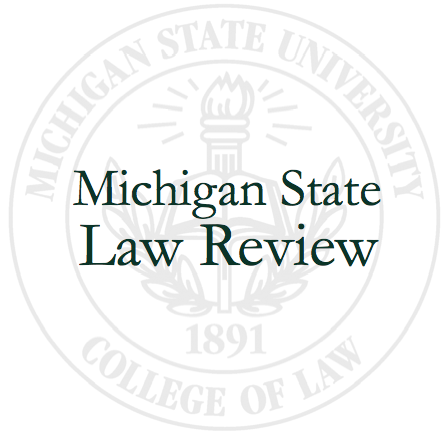2018-2019: Distribution, Public Values, and Private Law
Distribution, Public Values, and Private Law was the Michigan State Law Review’s first venture into a symposium workshop series—a hands-on, modern approach to the symposium format where authors visit the College of Law and workshop their pieces for the symposium in front of journal members and law school faculty. This symposium focused on the ever-important intersection of private values and public law, discussing the vast array of laws that shape how we make decisions, carry out business, and live in this dynamic, modern world.
Read Volume 2019’s Symposium Articles here.
Symposium Scholars
Julia D. Mahoney & Edmund W. Kitch, Professors at the University of Virginia School of Law: “Restructuring United States Government Debt: Private Rights, Public Values, and the Constitution”
Julia D. Mahoney teaches courses in property, government finance, constitutional law and nonprofit organizations. A graduate of Yale Law School, she joined the University of Virginia faculty as an associate professor in 1999 and is now John S. Battle Professor of Law.
Edmund Kitch joined the University of Virginia Law School faculty in 1982. His scholarly and teaching interests include agency, corporations, securities, antitrust, industrial and intellectual property, economic regulation and legal and economic history.
Professor Julia D. Mahoney & Professor Edmund W. Kitch
Clayton P. Gillette, Professor at the New York University School of Law: “How Cities Fail: Service Delivery Insolvency and Municipal Bankruptcy”
Clayton Gillette’s teaching and scholarship concentrate on contracts, commercial law, and local government law. His research concerns issues as varied as local redistribution, contract design, long-term contracts, the political economy of international sales law, standard form contracts, municipal bankruptcy, and relations between localities and their neighbors. Professor Gillette also serves as Director of the Marron Institute of Urban Management at NYU. He has recently supervised students working on governance structures that increase fiscal stability for the Office of the Emergency Manager of the City of Detroit, and has consulted in litigation and arbitrations on subjects ranging from the interpretation of sophisticated financial contracts to defaults on municipal bonds.
Professor Clayton P. Gillette
Robert Merges, Professor at the University of California, Berkeley School of Law: “National Sovereignty and International Patent Law”
Before joining the Berkeley Law faculty in 1995, Robert Merges was a faculty member at Boston University School of Law and served as a visiting professor at Harvard Law School. He has also been a Visiting Professor at Stanford Law School. Merges is a co-founder and co-Faculty Director of the Berkeley Center for Law and Technology, cornerstone of Berkeley Law’s intellectual property program, rated number one among IP programs by USNews in 12 of the past 13 years.
Professor Robert Merges
Matthew C. Stephenson, Professor at Harvard Law School: “The Qualities of Public Servants Determine the Quality of Public Service”
Matthew Stephenson is Professor of Law at Harvard Law School, where he teaches administrative law, legislation and regulation, anti-corruption law, and political economy of public law. His research focuses on the application of positive political theory to public law, particularly in the areas of administrative procedure, anti-corruption, judicial institutions, and separation of powers.
Professor Matthew Stephenson
Lisa Larrimore Ouellette, Associate Professor at Stanford Law School, & Rebecca Weires: “University Patenting: Is Private Law Serving Public Values?”
Lisa Larrimore Ouellette is an Associate Professor at Stanford Law School. Her scholarship addresses empirical and theoretical problems in intellectual property and innovation law. She takes advantage of her training in physics to explore policy issues such as how scientists use the technical information in patents, how scientific expertise might improve patent examination, the patenting of publicly funded research under the Bayh–Dole Act, and the integration of IP with other levers of innovation policy. She has also written about how online search results could address the evidentiary problem of trademark distinctiveness, the value of online surveys in First Amendment cases, and about the potential for different standards of review to create what she terms “deference mistakes” in numerous areas of law.
Professor Lisa Larrimore Ouellette
Duane Rudolph, Visiting Assistant Professor of Law at Peking University School of Transnational Law: “When Should Water Belong to the Public?”
Duane Rudolph was a Visiting Assistant Professor of Law at Peking University School of Transnational Law in Shenzhen, China and is now Professor at the University of Maine School of Law. He received his J.D. from Harvard Law School, his M.A. and Ph.D. in Romance Studies from Cornell University, and before his current position, he served as the Reginald F. Lewis Fellow for Law Teaching at Harvard Law School.
Professor Duane Rudolph






